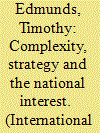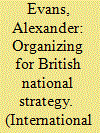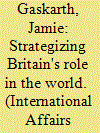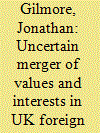|
|
|
Sort Order |
|
|
|
Items / Page
|
|
|
|
|
|
|
| Srl | Item |
| 1 |
ID:
131437


|
|
|
|
|
| Publication |
2014.
|
| Summary/Abstract |
British strategy-making has been subject to a sustained critique in recent years, from parliamentarians, retired members of the armed forces and scholars of strategic studies. This article examines the nature of this critique and the evolving character of strategic practice in Britain. It argues that the criticisms of British strategymaking are often misplaced, for two main reasons. First, many base their critique on a reductionist notion of unitary 'national interest' that fails to capture systemic patterns of complexity and contestation in the wider security environment and in Britain. Second, they underestimate or ignore the extent to which the UK strategic community is itself innovating in response to these themes, particularly since the 2010 Strategic Defence and Security Review. This is not to argue that considerable challenges do not remain for strategy-making in Britain. Most notably, these include: how to translate strategic innovation in departments and elsewhere into a coherent national strategic agenda; how to do this while maintaining institutional coordination and a shared sense of strategic purpose across government (and beyond); how to sustain and consolidate institutional expertise and experience in a rapidly changing civil service and at a time of continuing public austerity; and how to articulate and legitimate security policy decisions among a general public that is both disengaged from elite strategic discourse and sceptical of the efficacy of military force. Even so, the article concludes by arguing that it is possible to see the outline of an emergent and distinctive theory of action in contemporary British strategic practice, characterized by principles of adaptivity, anticipation, self-organisation and nascent cross-governmentalism.
|
|
|
|
|
|
|
|
|
|
|
|
|
|
|
|
| 2 |
ID:
131436


|
|
|
|
|
| Publication |
2014.
|
| Summary/Abstract |
In December 1968 Ernest May asked how the US government could gain access to 'long-headed' staffers to provide greater strategic depth to foreign policy. The challenge of long-term strategy persists: how should government be organized to support it, how can the right people be found to staff it and how can political leaders make time for longer-term policy-making given the challenge of the immediate? The policy planning staff in the Foreign and Commonwealth Office have traditionally had the task of supporting longer-range, broader foreign policy. A small group of diplomats-later leavened by externals from the media, non-profit and private sectors-was meant to generate an improved approach to British interests and policy. As Robert Wade-Gery recalls of its role in the 1960s, there was a push to forge fresh links with outside thinking. Did it work? Former policy planners can be circumspect about its achievements. One former British planner said he felt like 'a spare part rattling around in a tin', while former American planners have written about the challenge of injecting fresh thinking when detached from decision-making. Other planners were dragged into operational work or speechwriting. Many planners nonetheless enjoyed the opportunity to think more broadly. Policy planning can be intellectually rich without being the source of actionable strategic thinking about the long-term national interest. This article suggests that a greater focus on people rather than systems might help to foster more strategic, anticipatory and innovative thinking about the national interest.
|
|
|
|
|
|
|
|
|
|
|
|
|
|
|
|
| 3 |
ID:
131439


|
|
|
|
|
| Publication |
2014.
|
| Summary/Abstract |
In recent commentaries on British foreign policy, the New Labour and coalition governments have been criticized for lacking strategic thinking. Academics describe a 'strategy gap' and note that old ideas about Britain's role in the world, such as Churchill's 1948 reference to 'three circles', continue to be recycled. Parliamentarians bemoan the 'uncritical acceptance of these assumptions' that has led to 'a waning of our interests in, and ability to make, National Strategy'. This article argues that a primary problem has been the lack of consideration of how identity, strategy and action interrelate in foreign policy. Using the insights of role theory, the article seeks to address this by outlining six ideal-type role orientations that the UK might fulfil in world politics, namely: isolate, influential (rule of law state), regional partner, thought leader, opportunist-interventionist power and Great Power. By considering how variations in a state's disposition towards the external environment translate into different policy directions, the article aims both to highlight the range of roles available to policy-makers and to emphasize that policy often involves making a choice between them. Failure to recognize this has resulted in role conflicts and policy confusion. In setting out a variety of different role orientations, the author offers a route to introducing a genuine strategic sensibility to policy-making, one that links identity with policy goals and outcomes.
|
|
|
|
|
|
|
|
|
|
|
|
|
|
|
|
| 4 |
ID:
131438


|
|
|
|
|
| Publication |
2014.
|
| Summary/Abstract |
How should ethics and values relate to the British national interest? The idea that ethical commitments to distant non-citizens should occupy a position within British foreign policy was a controversial element of Labour's foreign policy during the early part of their 1997-2010 tenure. Rather than undermining traditional national interest concerns, one of the defining themes within Labour's foreign policy was that values and national interests were becoming increasingly merged in a globalized world. The post-2010 coalition government has made distinct efforts to differentiate themselves from their predecessors, crafting a more pragmatic and national interest-based foreign policy approach. Despite this, significant continuities with Labour's 'ethical dimension' are evident and many associated policies and practices have survived the transition. Moreover, the suggestion that British values and interests are interrelated and mutually reinforcing has been re-asserted, with renewed vigour, by coalition policy-makers. The article traces the ways in which values and interests have become increasingly merged in the language of recent British foreign policy and examines the implications for our understanding of the UK's national interest. It argues that the idea of an almost symbiotic relationship between values and interests is fundamentally unhelpful and makes the case for greater disaggregation of the two. Although a zero-sum game need not exist between core national interests and ethical obligations abroad, the suggestion that they are mutually reinforcing obscures the tensions that frequently arise between these different realms of obligation. Using the examples of failed state stabilization and UK arms trade regulation, the article demonstrates how uncritical acceptance of the values-interests merger risks producing unstable policy formulations.
|
|
|
|
|
|
|
|
|
|
|
|
|
|
|
|
|
|
|
|
|